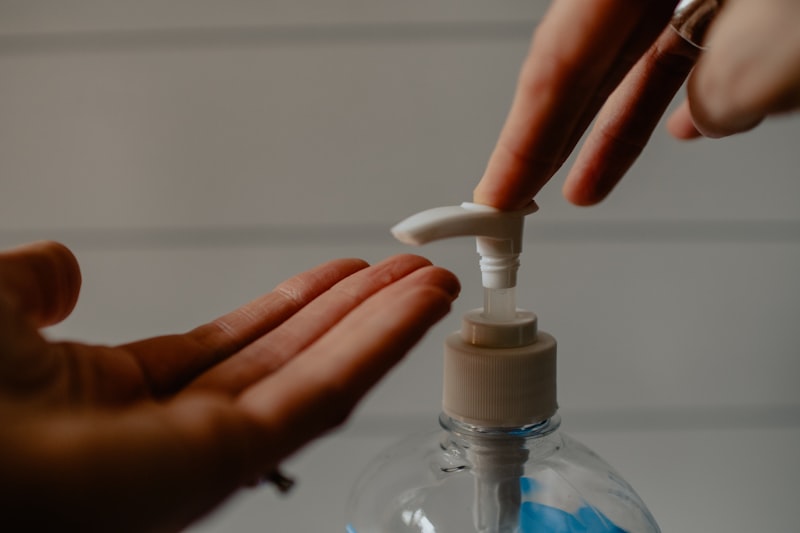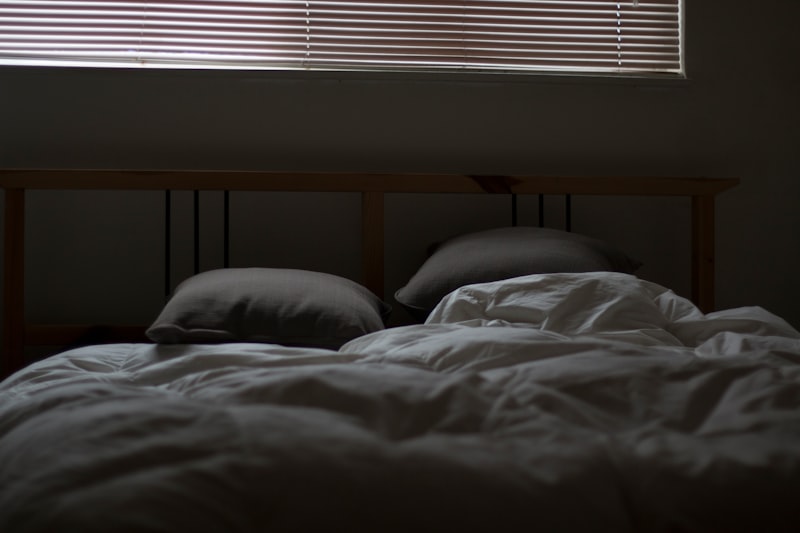
Struggling to get a good night’s sleep? Your sleep hygiene might be the culprit. Sleep hygiene refers to habits and practices that promote healthy sleep. Here are some effective tips to improve your sleep hygiene and get those much-needed Zzzs:
-
Stick to a Sleep Schedule: Consistency is key. Try to go to bed and wake up at the same time every day, even on weekends. This helps regulate your body’s internal clock.
-
Create a Relaxing Bedtime Routine: Wind down before bed with calming activities like reading a book, taking a warm bath, or practicing relaxation exercises. This signals to your body that it’s time to sleep.
-
Optimize Your Sleep Environment: Make your bedroom conducive to sleep by keeping it cool, quiet, and dark. Consider blackout curtains, earplugs, or a white noise machine to block out distractions.
-
Limit Exposure to Screens: The blue light emitted by phones, tablets, and computers can interfere with your sleep. Try to avoid screens at least an hour before bedtime, or use apps that filter blue light.
-
Watch What You Eat and Drink: Avoid large meals, caffeine, and alcohol close to bedtime. These can disrupt sleep patterns and make it harder to fall asleep.

Stay Active: Regular exercise can improve sleep quality. Aim for at least 30 minutes of moderate exercise most days, but avoid vigorous workouts close to bedtime.
-
Manage Stress: Stress and anxiety can keep you awake at night. Practice relaxation techniques such as deep breathing, meditation, or yoga to calm your mind before bed.
-
Limit Naps: While short naps can be refreshing, long or irregular napping during the day can interfere with nighttime sleep. Keep naps to 20-30 minutes and avoid them late in the day.
-
Evaluate Your Mattress and Pillows: A comfortable mattress and supportive pillows are essential for quality sleep. Replace them if they’re old or no longer provide adequate support.
-
Seek Professional Help if Needed: If you’ve tried these tips and still have trouble sleeping, consider talking to a doctor or sleep specialist. They can help identify underlying sleep disorders or provide further guidance.
Improving your sleep hygiene takes time and effort, but the benefits of a good night’s sleep are well worth it. Incorporate these tips into your nightly routine to promote better sleep and overall well-being.
Unlock Your Best Sleep: Essential Tips for Better Sleep Hygiene
Tired of tossing and turning at night? Achieving a good night’s sleep is not just about the hours spent in bed; it’s about the quality of sleep you get. Sleep hygiene plays a crucial role in improving sleep quality and overall well-being. By adopting simple yet effective habits, you can unlock your best sleep and wake up feeling refreshed every morning.
Firstly, establish a consistent sleep schedule. Our bodies love routines, so try to go to bed and wake up at the same time every day, even on weekends. This helps regulate your body’s internal clock, making it easier to fall asleep and wake up naturally.
Create a relaxing bedtime routine to signal to your body that it’s time to wind down. This could include activities like reading a book, taking a warm bath, or practicing deep breathing exercises. Avoiding stimulating activities like scrolling through your phone or watching TV right before bed can also help calm your mind.
Pay attention to your sleep environment. Make sure your bedroom is conducive to sleep by keeping it cool, dark, and quiet. Invest in a comfortable mattress and pillows that support your sleeping position. Sometimes, even small adjustments like using blackout curtains or a white noise machine can make a big difference.
Limit your intake of caffeine and alcohol, especially in the hours leading up to bedtime. These substances can interfere with your sleep cycle and prevent you from getting deep, restorative sleep. Instead, opt for a soothing cup of herbal tea or warm milk, known for their sleep-inducing properties.
Regular exercise is another key component of good sleep hygiene. Aim for at least 30 minutes of moderate exercise most days of the week, but try to finish your workout at least a few hours before bedtime to allow your body time to wind down.

Lastly, manage stress and anxiety. Practice relaxation techniques such as meditation or yoga to help quiet your mind before bed. If you find yourself worrying about tomorrow’s tasks, try jotting down a to-do list to clear your mind and ease bedtime anxiety.
By incorporating these tips into your daily routine, you can improve your sleep hygiene and enjoy better quality sleep. Remember, good sleep is essential for overall health and well-being, so prioritize it like any other aspect of your wellness routine.
Mastering Sleep: 10 Expert Tips for Better Sleep Hygiene
Struggling to get a good night’s sleep? Achieving better sleep hygiene can make a world of difference in your overall well-being. Sleep hygiene refers to habits and practices that promote quality sleep. Here are 10 expert tips to help you master the art of good sleep:
-
Stick to a Sleep Schedule: Going to bed and waking up at the same time every day, even on weekends, helps regulate your body’s internal clock.
-
Create a Relaxing Bedtime Routine: Wind down before bed with calming activities like reading or taking a warm bath. This signals to your body that it’s time to sleep.
-
Optimize Your Sleep Environment: Make sure your bedroom is cool, dark, and quiet. Invest in a comfortable mattress and pillows that support good posture.
-
Limit Exposure to Screens: The blue light emitted by phones, tablets, and computers can interfere with melatonin production. Avoid screens at least an hour before bed.
-
Watch What You Eat and Drink: Avoid heavy meals, caffeine, and alcohol close to bedtime. These can disrupt sleep patterns and cause nighttime awakenings.

Get Regular Exercise: Physical activity during the day promotes better sleep at night. Aim for at least 30 minutes of moderate exercise most days of the week.
-
Manage Stress: Practice relaxation techniques such as deep breathing, meditation, or yoga to reduce stress levels that can interfere with sleep.
-
Limit Daytime Naps: If you need to nap, keep it short (20-30 minutes) and avoid napping late in the day, as this can make it harder to fall asleep at night.
-
Establish a Pre-Sleep Ritual: Engage in calming activities before bed, like listening to soothing music or practicing gratitude. This helps signal your body that it’s time to wind down.
-
Seek Professional Help if Needed: Persistent sleep problems may indicate an underlying sleep disorder. Consult a healthcare professional for proper diagnosis and treatment.
By incorporating these expert tips into your nightly routine, you can improve sleep quality and wake up feeling refreshed and energized each morning. Start mastering your sleep hygiene today for better overall health and well-being.
Sleep Smarter: Practical Tips for Improving Sleep Hygiene
Are you tired of tossing and turning at night, unable to get a good night’s sleep? Sleep hygiene might just be the missing piece to your puzzle of restlessness. It’s not just about the hours you spend in bed; it’s about the quality of sleep you get. Let’s dive into some practical tips that can help you sleep smarter and wake up feeling refreshed.
Your body loves routine, especially when it comes to sleep. Try to go to bed and wake up at the same time every day, even on weekends. This helps regulate your body’s internal clock, making it easier to fall asleep and wake up naturally.

Do you find yourself scrolling through social media or watching TV right up until bedtime? It’s time to rethink your pre-sleep routine. Engage in calming activities like reading a book, taking a warm bath, or practicing deep breathing exercises. These signals to your brain that it’s time to wind down.
Your bedroom should be a sanctuary for sleep. Keep it cool, quiet, and dark to create an ideal sleep environment. Consider investing in comfortable bedding and a supportive mattress that suits your sleeping style.
The blue light emitted by smartphones, tablets, and computers can interfere with your body’s production of melatonin, the hormone that regulates sleep. Aim to power down electronics at least an hour before bedtime to allow your brain to unwind.
Avoid heavy meals, caffeine, and alcohol close to bedtime. These can disrupt your sleep patterns and make it harder to fall asleep. Instead, opt for a light snack if you’re hungry, and stay hydrated throughout the day.
Regular physical activity can promote better sleep, but timing is key. Exercise earlier in the day rather than right before bedtime to avoid stimulating your body when you should be winding down.
Stress and anxiety can keep your mind racing at night. Practice relaxation techniques such as meditation or journaling to clear your mind before bed. If worries persist, consider talking to a therapist or counselor for additional support.
Everyone’s sleep needs are different. Pay attention to how you feel after different amounts of sleep, and adjust your routine accordingly. Quality sleep is about feeling refreshed and alert during the day, not just hitting a specific number of hours.
Improving your sleep hygiene takes time and effort, but the benefits are well worth it. By incorporating these practical tips into your nightly routine, you can take control of your sleep and wake up ready to tackle the day ahead.
The Ultimate Guide to Better Sleep Hygiene: Tips and Tricks
Are you struggling to get a good night’s sleep? Your sleep hygiene might be the key to unlocking better rest. Sleep hygiene isn’t just about cleanliness; it encompasses all the habits and practices that influence your sleep quality. By improving your sleep hygiene, you can experience deeper, more restorative sleep each night.
One of the most effective tips for better sleep hygiene is maintaining a consistent sleep schedule. Try to go to bed and wake up at the same time every day, even on weekends. This helps regulate your body’s internal clock, making it easier to fall asleep and wake up naturally.
Creating a bedtime routine can also signal to your body that it’s time to wind down. This could include activities like reading a book, taking a warm bath, or practicing relaxation techniques such as deep breathing or meditation. These calming rituals can prepare your mind and body for sleep, reducing the time it takes to fall asleep.
Another crucial aspect of good sleep hygiene is optimizing your sleep environment. Make sure your bedroom is cool, quiet, and dark. Consider using blackout curtains or a white noise machine to block out distractions. Your mattress and pillows should be comfortable and supportive, promoting a restful sleep posture.
Limiting exposure to screens, especially before bedtime, is essential for better sleep hygiene. The blue light emitted by smartphones, tablets, and computers can interfere with your body’s production of melatonin, a hormone that regulates sleep. Try to turn off screens at least an hour before bed, and consider using apps or settings that reduce blue light emission.
Maintaining a healthy lifestyle also contributes to better sleep hygiene. Regular exercise can help you fall asleep faster and enjoy deeper sleep cycles. However, avoid vigorous exercise close to bedtime, as it may energize your body rather than relax it.
Lastly, be mindful of what you eat and drink, especially in the hours leading up to bedtime. Avoid caffeine and nicotine, which are stimulants that can disrupt sleep. Alcohol may initially make you feel sleepy, but it can interfere with the quality of your sleep later in the night.
Improving your sleep hygiene takes time and commitment, but the benefits are worth it. By incorporating these tips and tricks into your nightly routine, you can create an environment that promotes better sleep and overall well-being.
Transform Your Nights: Effective Tips for Better Sleep Hygiene
Struggling to get a good night’s sleep? Enhancing your sleep hygiene can make a world of difference in your overall well-being. Sleep hygiene refers to practices and habits that promote quality sleep on a regular basis. By incorporating a few simple adjustments into your nightly routine, you can transform restless nights into rejuvenating sleep sessions.
Firstly, consider your sleep environment. Is your bedroom conducive to sleep? Optimize it by keeping the room cool, dark, and quiet. Invest in a comfortable mattress and pillows that support your body properly. Your surroundings play a crucial role in signaling to your brain that it’s time to unwind.
Next, establish a consistent sleep schedule. Going to bed and waking up at the same time every day helps regulate your body’s internal clock, making it easier to fall asleep and wake up naturally. This consistency reinforces your circadian rhythm, the biological process that regulates sleep-wake cycles.
Limiting screen time before bed is essential for better sleep hygiene. The blue light emitted by screens can interfere with the production of melatonin, a hormone that regulates sleep. Instead of scrolling through your phone or watching TV, engage in relaxing activities like reading a book or practicing deep breathing exercises.
Speaking of activities, regular exercise during the day can improve sleep quality. Physical activity helps reduce stress and anxiety, which are common contributors to sleep disturbances. Just remember not to exercise too close to bedtime, as it may energize your body and make it harder to wind down.
Mindfulness and relaxation techniques are powerful tools for promoting better sleep. Consider incorporating practices such as meditation or progressive muscle relaxation into your nightly routine. These techniques help quiet the mind and prepare your body for sleep.
Lastly, watch what you consume before bedtime. Avoid heavy meals, caffeine, and alcohol close to bedtime, as they can disrupt your sleep patterns. Opt for light snacks if you’re hungry, and drink herbal teas like chamomile, known for their calming effects.
By implementing these effective tips for better sleep hygiene, you can transform your nights from restless to restorative. Consistency and mindfulness are key—listen to your body’s needs and create a sleep routine that works for you. Embrace these changes, and watch as your sleep quality improves, leaving you feeling refreshed and ready to conquer each day.
Sleep Like a Pro: Proven Tips for Better Sleep Hygiene
Firstly, let’s talk about the importance of a consistent sleep schedule. Just like how athletes stick to a training regimen, your body loves a routine. Going to bed and waking up at the same time every day helps regulate your body’s internal clock, making it easier to fall asleep and wake up naturally.
Next up, create a bedtime ritual that signals to your body it’s time to wind down. This could be anything from reading a book, taking a warm bath, or practicing relaxation exercises like deep breathing or meditation. These calming activities help reduce stress levels and prepare your mind for a restful night ahead.
Now, let’s address the elephant in the room – screen time. We all love our devices, but the blue light emitted from phones, tablets, and computers can interfere with the production of melatonin, the hormone responsible for sleep. Try to power down your devices at least an hour before bed, or use blue light filters to minimize its impact.
Speaking of environment, your bedroom plays a crucial role in your sleep quality. Keep your room cool, dark, and quiet. Invest in a comfortable mattress and pillows that support your sleeping position. Consider blackout curtains or an eye mask if streetlights or early morning sunlight disrupt your sleep.
Lastly, watch what you eat and drink before bedtime. Avoid heavy meals, caffeine, and alcohol close to bedtime, as they can interfere with your ability to fall asleep and stay asleep.
By implementing these proven tips into your sleep hygiene routine, you’ll be well on your way to sleeping like a pro and waking up ready to conquer the day ahead. So, why wait? Start tonight and see the difference it makes in your sleep quality and overall well-being.
Frequently Asked Questions
What are the best bedtime routines for improving sleep hygiene?
Discover effective bedtime routines that enhance sleep hygiene by promoting relaxation and signaling to your body that it’s time to wind down. Establish a consistent sleep schedule, limit screen time before bed, practice relaxation techniques like deep breathing or meditation, and create a comfortable sleep environment. These routines can help improve sleep quality and overall well-being.
How can I create a sleep-friendly environment at home?
Discover how to create an ideal sleep environment at home with practical tips for reducing noise, controlling light, maintaining comfortable temperature, and optimizing bedding for better sleep quality.
Why is it important to maintain a consistent sleep schedule?
Maintaining a consistent sleep schedule is crucial for overall health and well-being. It regulates your body’s internal clock, known as the circadian rhythm, which helps optimize sleep quality. Consistency in sleep times supports better cognitive function, mood stability, and immune system function. It also reduces the risk of sleep disorders and enhances daytime alertness and performance.
How can reducing screen time before bed improve sleep hygiene?
Reducing screen time before bed enhances sleep hygiene by minimizing exposure to blue light, which can disrupt the body’s natural sleep-wake cycle. This practice promotes better sleep quality and helps regulate melatonin production, crucial for a restful night.
What role does diet play in promoting better sleep hygiene?
Learn about the significant impact of diet on sleep hygiene and how certain foods and habits can either promote or hinder quality sleep. Discover practical dietary tips to improve your sleep patterns naturally.



